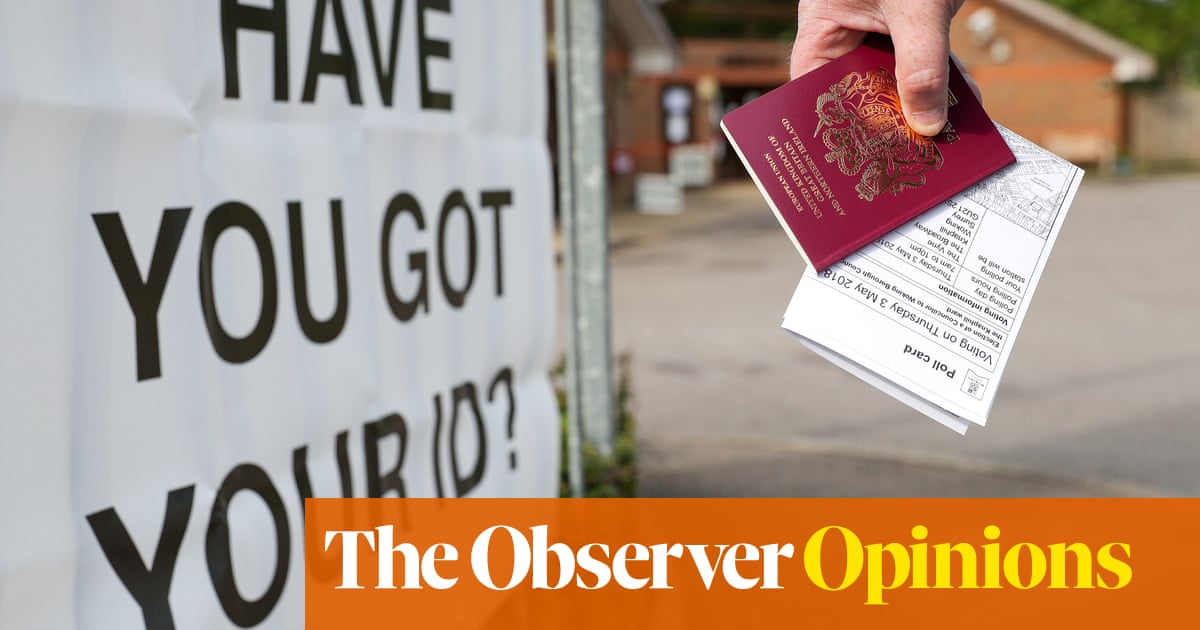
‘Britain has never been a ‘papers, please’ society,” said Jacob Rees-Mogg, speaking on his GB News radio show last week. “I’ve always loved the quotation from the historian AJP Taylor, who wrote that ‘until August 1914, a sensible, law-abiding Englishman could pass through life and hardly notice the existence of the state beyond the post office and the policeman’. But the world has changed… is it time to sacrifice freedom for administrative efficiency, and bow down to po-faced officialdom?”
What prompted this rallying cry for freedom? A subject that has ebbed in and out of public discourse for decades: whether or not every Brit should be required to carry an identity card. It ebbed in again last week when former Labour home secretary David Blunkett challenged Keir Starmer to set up a national ID scheme to tackle the small boats crisis, which in turn prompted the usual lines of debate.
How would such a scheme even work? Would it constrain too many freedoms? How expensive would it be? Would it help the small boats crisis? Could a bungling government be trusted to get it right?
But on one thing, though, Rees-Mogg is wrong, as are other libertarian politicians such as Liz Truss. Britain is a papers, please society. A YouGov poll last year showed that a majority of the public supported compulsory ID cards, as well as CCTV cameras in every public place and a national database of citizens’ fingerprints. Neither is Rees-Mogg preaching to his base: the same poll showed that Conservative voters were much more likely than average to support all these measures.
But the idea of Brits as pro-freedom anti-statists tends to linger wistfully in the minds of politicians such as Rees-Mogg, even as a tottering pile of evidence builds to show just the opposite. Wide support for ID cards and other forms of surveillance is just the start of it. These days, sensible, law-abiding Englishmen tend to demand more from the state than the post office and the odd policeman. They want it to work well and solve big social problems. They want administrative efficiency. They want po-faced officialdom. And they are prepared to sacrifice freedoms to get it.
One example is our changing attitude to the so-called nanny state. A paper last year by Aveek Bhattacharya, of the Social Market Foundation, showed that the public were largely in favour of policies that crack down on their freedoms to gamble, smoke, drink and consume food that is bad. One salient motive seems to be to protect the state from people who might take it for a ride: taxpayers and the NHS should not be burdened, people feel, with those who treat themselves recklessly.
Politicians were surprised when Brits complied so quickly and quietly with sweeping restrictions over the pandemic. It turned out that people were not as “freedom loving” as the then prime minister had assumed.
Brits have changed. Call it an identity crisis
In exchange, people also demand more from the state these days. Both Labour and Conservative offer far more free childcare. The state stepped in to top up people’s bank accounts during the pandemic, and helped them out again when energy prices went up in 2022.
And even as the government declares in a thin and reedy voice that it is in favour of freedoms, it has simultaneously increased its reach and power, amid little objection from a majority of voters. I wrote last month about the paradox of a “pro free speech” administration clamping down on the right to protest. The recent introduction of voter identification at polling stations, FT columnist Robert Shrimsley has pointed out, has eased the country in the direction of ID cards, as has the plan to progressively ban smoking for ever higher age cohorts.
Rishi Sunak rejects the idea of ID cards, while other Tory MPs have called the idea “a creepy state plan to track you from cradle to grave”. But they have ushered in the conditions to smooth its path.
The views of Rees-Mogg and other libertarians are long out of date. They were true, perhaps, around the middle of last century. A previous dalliance with identity cards, introduced during both world wars, ended in 1952 amid public protest. This was sparked by an act of resistance by Clarence Willcock, a former Liberal candidate, who refused to show his card when he was pulled over for speeding. “I am a Liberal,” he told the police, “and I am against this sort of thing.” Members of the British Housewives’ League then took to parliament to set fire to their ID cards. It was raining and only one managed it, but the cards were nevertheless ushered out.
But Brits have changed. Call it an identity crisis. If a Labour government decides to bring in ID cards, a subject on which it has recently softened, polls suggest the public would support it. Tories may at that point snipe from the opposition benches – but Labour can retort that they are out of touch, and hypocritical to boot.
And just why have we turned into a papers, please society? One reason, perhaps, is that, as state interventions are brought in, the process is normalised, and we become open to further nanny statism. There is rarely clamour to reverse smoking bans and seatbelt laws once they are in place. The pandemic may have had a hand in it too. As might rising immigration. As might our familiarity with handing over large amounts of personal data to tech companies.
But our change of heart may be due to broader factors, too. As society has liberalised, a vacancy has appeared. It used to be that family, neighbourhood communities and religions worked as our moral arbiters, telling us what was right and wrong, what was fair, what we owe to others, and how we should best organise our lives. But these have declined. Could it be that we need the state to stand in instead?
Martha Gill is an Observer columnist












